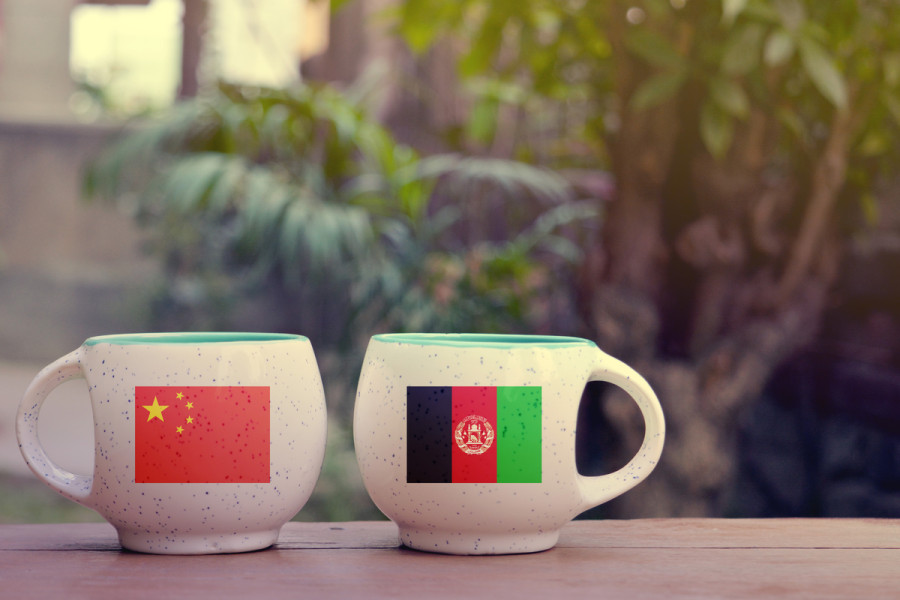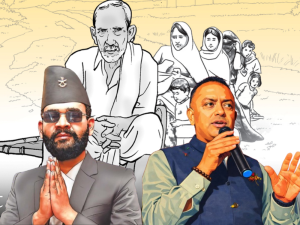Columns
Guns, bombs and the dragon’s diplomacy
China's policy in Afghanistan has become the most anticipated issue for its competitors.
Hindu Sanskriti Karki
Last month, China Daily was covered with pictures of the visiting Afghan delegation led by the head of the Afghan Taliban Political Commission Mullah Abdul Ghani Baradar and Chinese Foreign Minister Wang Yi. Observers couldn’t resist concluding that China’s vaccine diplomacy had already reached out to the Taliban. Not surprisingly, both parties agreed to meet and discuss potential areas of cooperation in Tianjin. At the meeting, they laid out their future expectations, signalling that the fall of Afghan President Ashraf Ghani was inevitable. This week, the Taliban overran the capital. This event has transformed the political and security dynamics in South Asia. Aware of the new regional structure, more volatile and fragile, China’s foreign policy in Afghanistan has become the most anticipated issue for its strategic competitors.
The Taliban have officially established the new Islamic Emirate of Afghanistan under their reign. The absolute failure of the liberal approach has prompted the world to rethink its modality towards Afghanistan—either corner the Taliban or reintegrate them into world politics. The vital players, comprised of 13 countries, made it clear that “they would not recognise any government in Afghanistan that is imposed through the use of military force”. Strikingly, Afghanistan underwent a political transition less chaotic than anticipated since its commitment to the Doha conference. President Ghani made safe passage to Tajikistan, the Afghan National Defence and Security Forces showed no resistance, and the Taliban rebels toppled Kabul and the presidential palace effortlessly. Subsequently, the question remains whether China, Germany, India, Norway, Pakistan, Qatar, Tajikistan, Turkmenistan, Turkey, the United States, the United Kingdom and Uzbekistan will provide global legitimacy to the Taliban government or not.
Soviet influence
Undoubtedly, China, which shares a rugged 76-km border with Afghanistan, is expected to play a significant role in shaping the future of the nation in turmoil. Although China's presence in Afghanistan has been scanty compared to other countries in South Asia, it has contributed significantly to liberating it from Soviet influence. Brigadier Mohammad Yousaf and Major Mark Adkin, in their book, The Bear Trap: Afghanistan’s Untold Story, highlight the role of the US, Saudi Arabia, Pakistan and China in strengthening the security apparatus to overthrow the Soviet-backed People’s Democratic Party of Afghanistan. However, the “Great Game” between the Soviet Union and the US only ended up leaving well-armed local groups, which later became the primary vehicle for bloody ethnic politics in the landlocked nation. Not until 1993, when the civil war in Afghanistan exploded into a conflagration, did many diplomatic missions rush to evacuate their citizens and close their operations. Once again, the nation is experiencing the same level of chaos and uncertainty.
In the current situation, would it be beneficial for China to adopt a more aggressive or cooperative strategy towards the new government in Afghanistan? With more nations aiming to denounce the Taliban government, it will be difficult for China to garner its national interest while avoiding becoming a pariah to the international community. Drawing from the concern put forth by Foreign Minister Wang Yi, it appears that the withdrawal of the US has augmented China’s responsibility to fight terrorism in Central Asia. China expects the Afghan Taliban to disassociate itself from all terrorist organisations including the East Turkestan Islamic Movement (ETIM) and promote regional security and stability through cooperation.
China’s overwhelming concern emanates from its Muslim separatist group, the ETIM, founded by militant Uyghurs, members of the Turkic-speaking ethnic majority in northwest China’s Xinjiang province. In the bid of the ETIM to create an independent state called East Turkestan—which would include parts of Afghanistan, Kazakhstan, Kyrgyzstan, Pakistan, Turkey, Uzbekistan and Xinjiang—China has encountered a spate of terrorist attacks, the latest in July. Operating outside China, most ETIM members have strengthened their network in Afghanistan. Therefore, it is likely for the Xinjiang region to experience trickle-down effects of any radical movement in Afghanistan. Besides, the US State Department's decision to remove the ETIM from its list of terrorist organisations in 2020 has exacerbated China's security concerns.
In its hope of suppressing the radical movement that could otherwise jeopardise domestic security, and accordingly, its position in the international arena, China must become cautious in devising its foreign policy in Afghanistan. Looking at the current developments, Beijing has sought to maintain friendly and cooperative ties. Apart from Xinjiang, a stable and cooperative administration in Kabul would help China secure its investments in Pakistan. Likewise, it would help China expand its Belt and Road Initiative via Afghanistan. However, looking at how China has burnt its previous investments in Afghanistan, the economic benefit is not a lucrative incentive for it to promote friendly relations with the war-torn nation.
World at risk
Ultimately, China’s commitment to rebuilding Afghanistan will come at an unprecedented cost. Since it would be too early to trust the new rulers, given the lack of institutions and governance, the modality of Chinese funding requires adequate scrutiny. If the Taliban channelises economic aid to strengthen military power, it might put the entire world at risk. Arguments put forward by scholars like Kautilya and Waltz show a possibility of the Taliban's interest in securing its military and political needs via economic means. Known as proponents of realism, both scholars nurture survival as the ultimate goal of a state; and to achieve that, it will seek to maximise security.
Naturally, a stronger Taliban means higher security concerns. Given past experiences, it would not be easy to view the Taliban government through an optimistic lens. Therefore, China's approach towards the new government in Afghanistan, as of now, is discreet. It is oriented only at getting a ground knowledge of the new government. Turning a deaf ear to the attempts made by the Soviets and the US to play a guardian's role can only become a burden for China. Convoluted in its domestic problems, its desire to play a constructive role in Afghanistan is likely to counter the rigid Taliban administration, which has always been hard to coordinate. Conclusively, China must be wary of the rebukes from the international community and the volatile domestic situation that still dominates the nation.




 10.95°C Kathmandu
10.95°C Kathmandu

.jpg&w=200&height=120)













